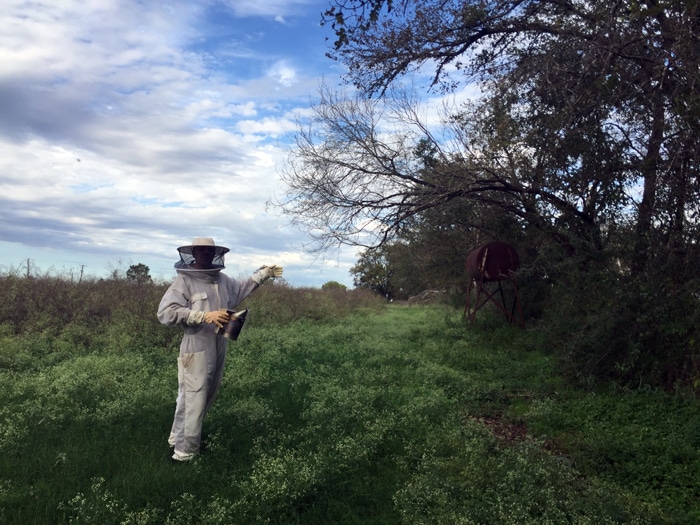
Suited up and walking through the field to the CrownFox Farms beehives.
CrownFox Farms is a Certified Wildlife Habitat on the periphery of East Austin. In the past year, the property acquired six beehives. Now, three acres among the twenty-acre total area are active with bees, wildlife and wildflowers. Owners Sarah King and Deano Jones hope to continue growing the positive ecological impact of the farm, so I was ecstatic about helping create more buzz by visiting the bees.
Inside the Hives
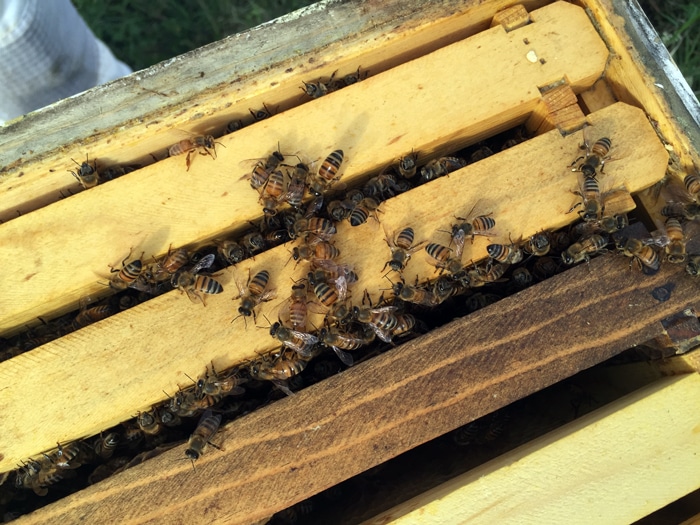
Peek inside a hive at CrownFox Farms.
Jones handed me a white beekeeper suit. After zipping, Velcro-ing and checking the uniform for any unnoticed holes, I was ready to meet the bees.
During a muddy, yet pretty, walk through a quintessential Texas landscape, the brightly-colored hives came into view. The bee abodes are spread at least nine feet apart, so potential disease and mites cannot travel easily from one hive to another.
Each hive has a distinct personality. Jones decided to introduce me to the notoriously mellow Russian bees. This community began with bees that had been ordered and shipped. Bees are tough enough to make it through the mail with some sugar to tide them over until their release.
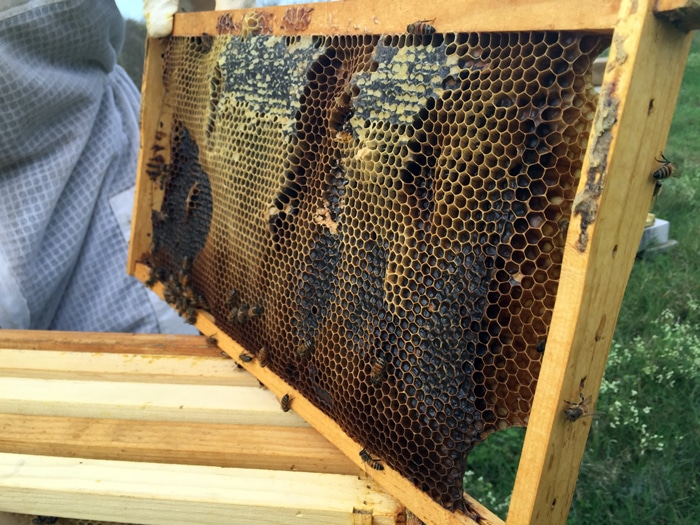
In this beautiful honeycomb, most of the bees were on the panels closest to the queen.
Since the weather during my visit was overcast and chilly, the bees were already subdued. As a further precaution, the use of a bee smoker (a can-like device with a bellow) triggered the bees to think they should gorge on honey to prepare for a possible fire emergency. Once they were full, they were less likely to bend their abdomen to sting whomever was around the hive.
Jones carefully took off the top of the hive and slowly lifted a panel out, so I could take a look. The honeycomb was beautiful, and the bees didn’t seem to mind us at all. The suit was saving me from mosquitos, more than bees.
The next panel Jones removed was completely crawling with bees. At this point, they had really started to buzz. I put my ear down closer to the hive and listened to the humming.
What’s So Interesting About Bees?
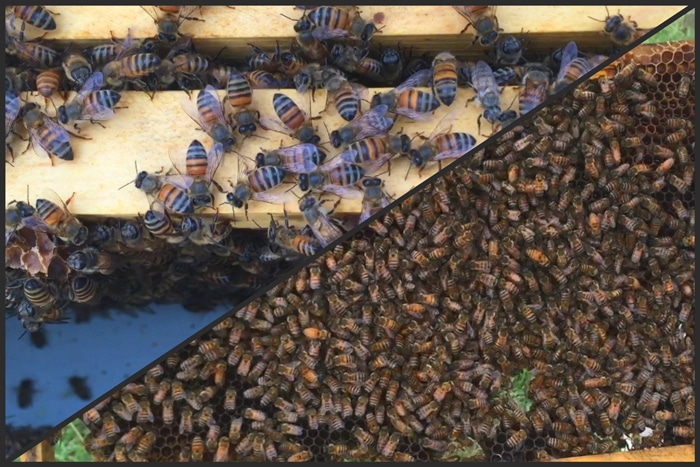
The queen bee might be on this busy panel.
“They’re fascinating, and it sounds corny, but you start to love them,” Jones told me. Bees are often misunderstood. They’re only willing to sting when they think their hive or life is threatened. If one lands on you, don’t panic. It probably just wants to lick the salt off your skin. For the most part, bees are docile, but there are famous exceptions.
Africanized bees took over headlines in recent years for their attacks. Jones told me CrownFox Farms has rehabilitated a couple of aggressive hives. In fact, this was his first introduction to beekeeping. After a friend dropped off a hostile hive on the property, Jones’ curiosity resulted in numerous stings.
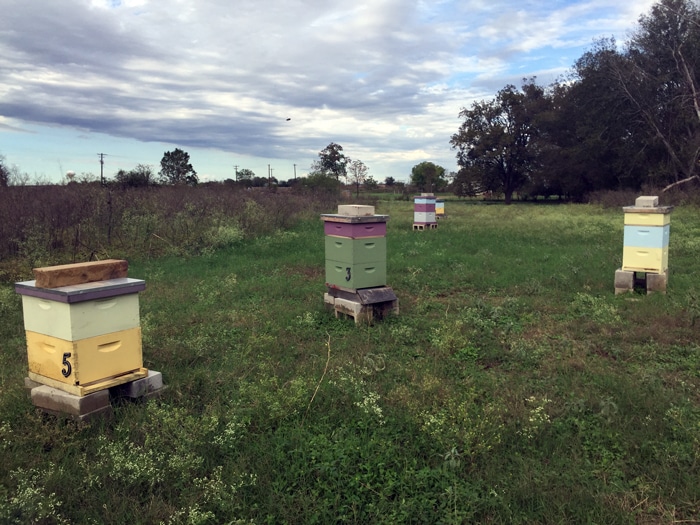
The six hives will soon have more neighbors.
In order to rehabilitate the hive, Jones had to find the queen and pinch (kill) her by putting her in alcohol. This method allows the pheromones to be preserved to catch swarms in the future. The hive lives a couple of days without a queen, and then a new one is introduced. In this case, the new queen was ordered from another apiary in Austin. (Queens are made by eating “royal jelly” from a hive.)
Future of CrownFox Farms
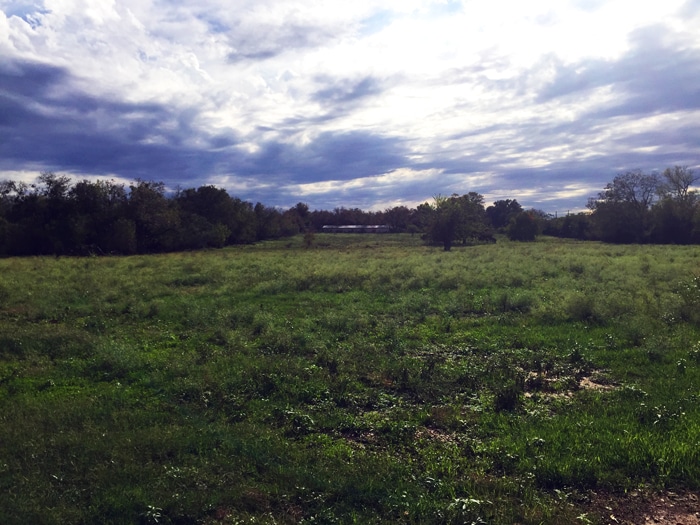
The beautiful, protected Texas landscape.
Through the help of David Stalker, a member of the Texas Master Beekeeping Program, Jones has learned to rehabilitate and keep the bees pleased. Stalker’s mentorship also taught Jones to leave more than enough honey for the bees. Though CrownFox Farms produces and sells some of their honey, their first priority is bee healthiness and happiness. Some commercial bee farms will strip all of their frames of honey, only leaving the bees pellets and sugar water for the winter. This can result in lost lives, which CrownFox Farms hopes to prevent.
Bee death is a serious ongoing issue in the world. Many experts point to the presence of neonicotinoids (insecticides) in pollen and nectar that destroy the central nervous system of bees. Bees are incredibly social, so just one sick bee can bring illness to an entire hive. Fortunately, since CrownFox Farms plants bee-friendly wildflowers, their bees don’t have to go far to find copious and clean pollen.
Halfway through the summer when the bees are mostly “done” with the wildflowers, CrownFox Farms will open a parking area for visitors to come and pick flowers and take photos in the beautiful field. This gives children and adults an opportunity to see some wildlife, as well. King plans on making a plexiglass hive, so visitors can also see the celebrated bees.
Your Participation Is Needed
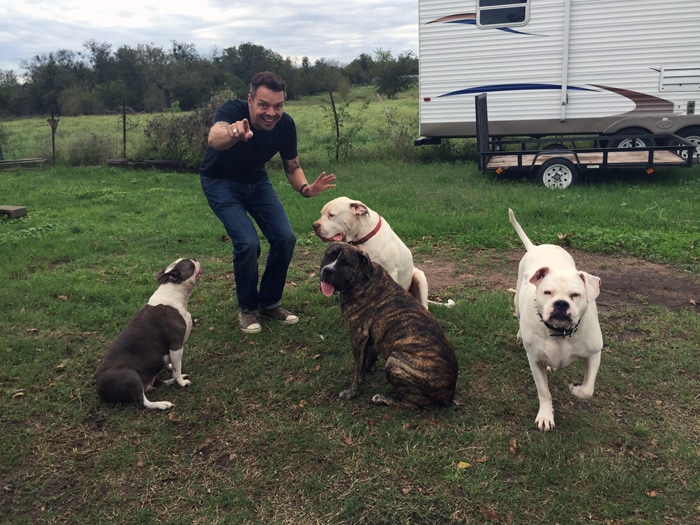
Deano Jones and his dogs pose for a photo.
Deer, foxes, coyotes and hawks are just some of the creatures that call this area of Texas home. There are developments popping up all around the farm, so these animals need a place to roam. CrownFox Farms plans on using money acquired from their current IndieGoGo campaign to irrigate their land and create watering holes for the creatures. The water will also nourish the blue sage, zinnias, cosmos and petunias that feed the bees. Check out their video to learn more.
Be sure to follow CrownFox Farms on Facebook, and check out their website for honey and lip balm products (when limited items are in stock).
With the enthusiasm of the owners, I can’t wait to see what the future holds for this East Austin farm and its fascinating inhabitants.
@MadameKLM wants to know:
Have you ever worn a beekeeper suit?
- Guide to Bat Season in Austin - July 20, 2020
- Reimagining Life With Rachel Ahern of Weird City Taxidermy - March 28, 2017
- SXSW Red Carpet Musings With Todrick Hall, Nick Offerman - March 22, 2017

Bee-keeping is fascinating. I guess I just don’t have any experience in it – but the techniques involved are incredible. I like honey, so I’m glad there are people out there taking care of this!
Nate
https://www.theliteracycenter.org/